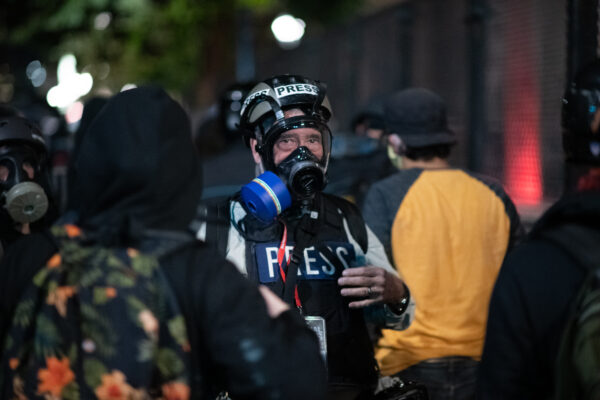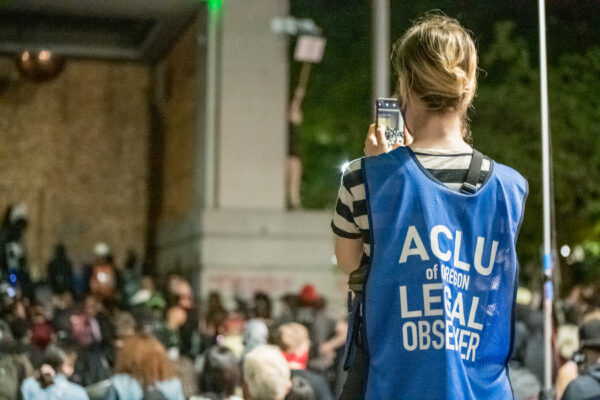At the Portland City Council Meeting on January 31, 2024, Commissioner Rene Gonzalez made statements indicating he supports the Portland Police Bureau’s use of unlawful surveillance in 2020, which infringed upon the rights of everyday people who protested for racial justice.
Gonzalez was responding to the ACLU of Oregon’s public testimony that raised concerns about a Council agenda item to approve the Portland Police’s annual Joint Terrorism Task Force (JTTF) report. The ACLU of Oregon and other justice organizations have monitored the City’s JTTF activities for decades because government bodies have repeatedly used the guise of “monitoring terrorism” to violate the privacy rights of law-abiding people, especially Black, brown, and Muslim people, as well as racial justice and environmental activists.
While testifying, ACLU of Oregon Associate Jude al-Ghazal Stone highlighted the Portland Police’s recent history of violating ORS 181A.250, a state law that protects Oregonians from invasive and unnecessary privacy infringements. Specifically, ORS 181A.250 prohibits Oregon law enforcement from collecting or maintaining information about people’s political, religious, or social views, activities, or associations without reasonable suspicion of criminal activity.
In his testimony, al-Ghazal Stone referenced a lawsuit against the Portland Police that the ACLU of Oregon won in September 2021: the judge found that the Portland Police violated Oregon law when they live-streamed protesters who were engaged in lawful First Amendment activities. By recording and broadcasting the footage, which often contained close-up shots of protesters’ faces, the Portland Police subjected people to invasive surveillance for their political activities without lawful justification. In doing so, the Portland Police not only broke the law but also endangered protesters. Broadcasting recognizable footage of people engaged in lawful and peaceful protest — particularly in real-time — allows anyone with internet access to identify them, their political stance, and their present location. Additionally, projecting protesters’ association with a political cause can make them vulnerable to professional and personal consequences in their workplaces and communities merely for attending a protest. The police’s live-stream also enabled local and federal agencies to readily identify law-abiding protesters and potentially maintain surveillance records of them without public knowledge or oversight. This is especially troubling given Oregon and federal law enforcement’s long histories of targeting Black and brown people and racial justice advocates like Dr. Martin Luther King, Jr.
In response to the ACLU of Oregon’s testimony, Gonzalez said: “There was [sic] allusions to the lawsuit over the 2020 broadcasting of the riots downtown. It was one of the clearest ways for people to see the real damage being done by the riots and in the name of transparency, I think we need to keep that front and center.”
Gonzalez’s statements indicate that he endorses the Portland Police’s violations of state law, and he appears to tacitly encourage the police to continue breaking state law to unlawfully invade the privacy rights of everyday Oregonians.
“You don’t get to choose who can and cannot break the law. Police officers — whose primary function is to enforce the law — must be held accountable when they violate state law and our fundamental rights. Commissioner Gonzalez’s words of open support for the police’s unlawful actions undermine community safety and our First Amendment rights to peaceful assembly and protest,” said al-Ghazal Stone. “It causes unique harm to the fabric of our society when the police, who are entrusted to uphold the law and authorized by the government to use handcuffs and firearms, are encouraged by elected officials like Gonzalez to abuse their authority.”
Aside from the dangerous implications of his comments, Gonzalez’s statement also misrepresents several key facts regarding the protests.
Throughout 2020, thousands of Oregonians protested for racial justice, and many also attended protests to oppose fascist tactics by the federal government under the Trump presidency. Gonzalez’s characterization of the protests as “riots” is unfounded and reminiscent of the Trump Administration’s attempts to paint Portland as violent to justify extreme police brutality. After reviewing factual evidence, the Ninth Circuit Court of Appeals recognized that most of the protests were peaceful and rejected the federal government’s attempts to argue otherwise. That a small number of people used the protests for their own purposes to engage in activities like breaking windows does not qualify an otherwise peaceful protest as a “riot,” nor does it justify illegal police surveillance of entire crowds of lawful protesters.
Furthermore, Gonzalez’s suggestion that the police’s live-stream offered a critical view of the 2020 protests in Portland overlooks the extensive media coverage that the protests garnered — despite the police’s active interference with journalists’ efforts. People wanting to view the events of downtown Portland were not limited to illegal police footage; vast amounts of lawful photographic and video reporting captured the protests. In fact, the ACLU of Oregon worked hard to protect members of the press and legal observers exercising their First Amendment rights to document the protests.
The ACLU of Oregon’s testimony is available here.
Commissioner Rene Gonzalez’s statement at the City Council meeting can be heard here.
###
Stay Informed
Sign up to be the first to hear about how to take action.
By completing this form, I agree to receive occasional emails per the terms of the ACLU’s privacy statement.
By completing this form, I agree to receive occasional emails per the terms of the ACLU’s privacy statement.


